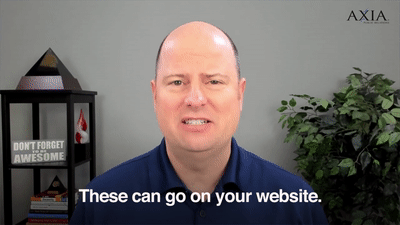The Public Relations Blog
We frequently blog about the latest public relations corporation communications, and marketing topics, tips, and trends. Our blog is one of the 100 Best Public Relations Blogs, according to FeedSpot. Please help yourself to our insights and be sure to subscribe to our weekly blog notifications.
If you have a website for your brand or company, you likely want to convert your site visitors into paying customers. The more website visitors you get, the higher the probability of converting them into customers. Higher conversion rates equal more sales and better profit margins at the end of the day.
The longer you can keep your website’s visitors on your site, the more you will increase your conversion rates and brand recognition in the long term. You will need to follow a few golden rules to achieve this and keep your audience coming back for more.
Read More
Topics: owned media, web media
Google Discover may be the answer to improving your company’s SEO. The updated feed experience contributes to spikes in website traffic and is transforming the way to reach users.
Google Discover was launched in September 2018 as a feature on Google’s app. It is a feed that recommends content to users based on their search history. Google Discover came from a revamping of the previous Google Feed, where the suggested content was primarily headlines and meta descriptions. Discover now includes more visuals and evergreen content, with customizations available to create a user-friendly experience. Users can follow topics they are interested in and view similar topics.
Why does this matter for your company’s SEO?
Read More
Topics: online public relations, owned media, web media
As you write content (blog posts, stories, and social media posts) with links to external websites, you don’t want long and awkward-looking URLs within your text. Those URLs don’t have to stick out like a sore thumb – you can replace them with anchor text, which is clickable text like this link to our homepage.
To determine which words to use for ultimate search-engine optimization, you need to make sure your anchor text is expressed briefly and clearly, relevant to the linked page, and specific.
Read More
Topics: web design & development, owned media, web media
With the large number of brands available to an even larger number of people, you have to find a way to reach your potential customers. The best way to do this is to create a list of SEO keywords for your company.
SEO keywords are words or phrases that consumers type in a browser to find what they are looking for. You want to associate the phrases your target audience is using with your company or website. But to find the best keywords for your company, you must first conduct keyword research.
Read More
Topics: SEO, owned media, web media
Testimonials can help sell your company’s services and goods
In today’s crowded world, it’s important that your company boasts how you’ve helped solve others’ problems and how its unique value proposition has been a benefit to others. This shows people why they should employ your company’s services or products over your competitors’. You can do this with a strong portfolio, but there’s another way to demonstrate value: testimonials.
Read More
Topics: PR tips, shared media, owned media
"Ranking without links is really, really hard." - Google.
Google’s algorithm has been based on links ever since its inception. Link building is one of its top three ranking factors. Undoubtedly, it is one of the most challenging search engine optimization tasks. It requires quality links with high authority to rank well on search engine ranking pages.
If you struggle to find effective white-hat link building techniques, we can help you. Here are the most practical link-building tips and tricks.
Read More
Topics: owned media, web media
Search engine optimization (SEO) is the most controversial concept in digital marketing. With every Google algorithm update, there is always a new SEO dead trend. Nevertheless, SEO continues to be one of the most significant inbound marketing strategies.
There is no doubt that SEO has changed over the years. Keyword stuffing and link buying are all in the past. Why is SEO still important for business’ success, both present and future?
Read More
Topics: online public relations, owned media, web media
Something PR professionals and social media have in common is they are both based on communication. However, social media has grown tremendously since it was first introduced because of its ability to connect people with information quickly. While the speed at which social media can produce a message can cause harm, it can also benefit PR with its “real-time messaging.” This can amplify the results of news/press releases, emails, blog posts, and other PR means. In an instant, social media can show a larger audience the content you create while also helping it last longer.
Read More
Topics: owned media, social media
Companies have news that consumers aren’t going to like
Not all news a company shares will be perceived as positive or beneficial to the target audiences. Consumers will consider some news, such as closing a location, laying off employees, discontinuing a product, a supply chain or shipping delay, or increased prices, to be bad news. This type of news happens at times. So, when’s the best time to announce “bad” news?
Read More
Topics: owned media, news media
A social media policy is an outline for how employees should conduct themselves online — both personally and professionally. When done right, social media policies set employees up for success and help companies curb issues with security, reputation, and the law.
Good social media policies are individualized to align with company culture, but there are certain guidelines that should always appear. Some of these key principles cover affiliation disclosure, do’s and don'ts of sharing information, and security protocols. After reading a social media policy, an employee should know what’s expected of them and recognize that both they and the company will be held responsible for their actions online. The permanence of social media posts isn’t to be taken lightly.
Read More
Topics: owned media, social media












Comment on This Article